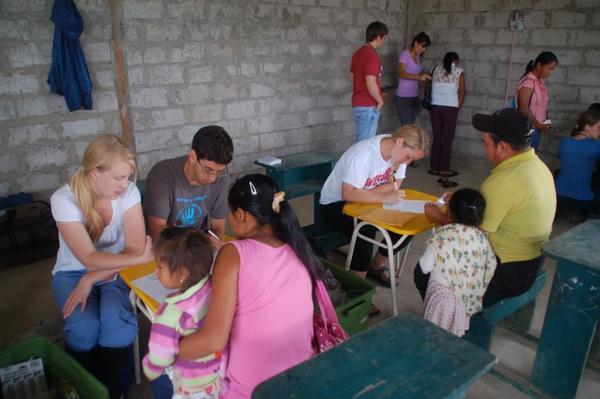Molly Elston, MS ’12, recently returned to the University of Notre Dame (UND) after serving as a Global Health Research Associate in Port-au-Prince, Haiti, for two years with the Health Systems Strengthening Initiative (HSSI). In 2013, UND partnered with Catholic Relief Services (CRS) and Catholic Health Association of the United States (CHA) to focus their expertise and resources on strengthening faith-based health systems in countries with little to no access to quality healthcare services through the HSSI. Réseau des Institutions Chrétiennes de Santé d'Haïti (RICSH), Haiti's largest faith-based hospital network, was one of two locations where the HSSI was piloted.

During her two years in Haiti, Elston played a significant role in program management, operations research, and monitoring and evaluation relative to the HSSI. For example, Elston, with support from UND and CRS, conducted a health network study to identify key characteristics related to the success of long-standing health facility networks in low and middle-income countries. The study included an analysis of various organizations’ management, finances, membership, and services in low and middle-income countries. The information gathered in this study was used to provide a summary of successful practices to burgeoning health networks. The result was a report titled, “Health Networks and Associations in Low and Middle Income Countries: Key Factors for Sustainability”, which was finalized and disseminated in August 2015.
During the development of the HSSI, UND, CRS, and CHA referred to the World Health Organization’s framework for Health Systems Strengthening activities which includes 6 building blocks. The HSSI activities in Haiti focused on the Medical Products, Drugs and Equipment building block. In line with the building block, Elston led foundational research on the pharmaceutical procurement landscape in Haiti. The qualitative and quantitative data gathered suggested a Group Purchasing Organization (GPO) could generate a significant savings for all participating hospitals. This information in hand, Elston worked with CHA and CRS to design a pilot Haitian GPO that is now ready to be deployed this fall.
Elston is a graduate of the University of Notre Dame’s Master of Science in Global Health professional degree program and her position in Haiti was supported by a gift from Saint Joseph Health System to the University of Notre Dame’s Eck Institute for Global Health. Elston states, “With the support from Saint Joseph Health System and the skills I learned in the MS in Global Health program, I feel that I was able to play an integral role in health systems strengthening in Haiti.”
About Saint Joseph Health System, Saint Joseph Health System (SJHS) is a not-for-profit healthcare system located in North Central Indiana that offers acute-based hospital care and post-acute services including: community wellness, physical rehabilitation, home care, physician clinics, outpatient services, independent and assisted senior living, memory care and affordable senior apartments. SJHS includes: Mishawaka Medical Center; Plymouth Medical Center; Rehabilitation Institute; Outpatient services of the Elm Road Medical Campus; Health Insurance Services; Saint Joseph Physician Network; VNA Home Care; and the Sanctuary Senior Living Communities at St. Paul's, Holy Cross and Trinity Tower. SJHS serves more than 200,000 members of the Michiana community annually. SJHS is a Regional Health Ministry of Trinity Health in Livonia, Mich.
About the Eck Institute for Global Health, The Eck Institute for Global Health recognizes health as a fundamental human right and endeavors to promote research, training, and service to advance health standards for all people, especially people in low-and middle-income countries, who are disproportionately impacted by preventable diseases. The Institute is responsible for the Master of Science in Global Health Program which is a 12-month, science-centric academic program that arms students with the knowledge, tools, and experience to be part of the solution to the global health crisis. The rigorous curriculum includes classroom training and experiential learning to prepare students for improving human health around the world, especially in poor and underserved people.
Photo: Elston seated at desk on right facing toward the right while writing.